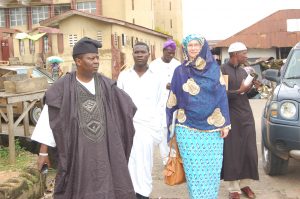
[mixcloud https://www.mixcloud.com/EdusoundsNg/public-space-as-an-institution-of-learning-an-interview-with-dr-insa-nolte/ width=100% height=120 hide_cover=1 light=1][/mixcloud]
Dr Insa Nolte had her first degree from the Freie Universität Berlin, Germany, after which she joined the Centre of West African Studies (now DASA) at the University of Birmingham as a PhD student to work on the history and politics of Remo under the supervision of Professors Paulo de Moraes Farias and Karin Barber. On completion of her PhD programme, she held the Kirk-Greene Junior Research Fellowship at St Antony’s College, Oxford, and then returned to DASA on completion of her fellowship at the University of Oxford to take up a lectureship in 2001 in DASA and was promoted to the position of a Reader in 2015.
Even though I was a foreigner and a stranger, there was always somebody around to play with or to talk to, so I really enjoyed myself.
It was Henry Giroux in his academic journal article in 2004 “Cultural Studies, Public Pedagogy, and the Responsibility of Intellectuals (PDF)“ that talked about public institutions like universities and theatres, as spaces of impacting knowledge on the public deliberately or otherwise by controlling what the public is exposed to in terms of the themes or knowledge such institutions focus on disseminating to the public and as such, impact directly or indirectly the world views of the public they serve.
For people that are not into the profession of teaching or education in general, the idea of pedagogy might sound vague and blurry, however, by understanding that pedagogy is the process by which knowledge is impacted, either directly (as in the case of formal schooling) or indirectly (as in the case of: mass media, theatre going, museums, social functions), then one would have come to understand the significance and the necessity to appreciate the concept of “critical pedagogy” (YouTube) as emphasised by Henry Giroux.
It is in line with the notion that public pedagogy is important that researchers at times, particularly, social researchers look into anthropological studies through the lens of ethnography.
[mixcloud https://www.mixcloud.com/EdusoundsNg/public-space-as-an-institution-of-learning-an-interview-with-dr-insa-nolte/ width=100% height=120 hide_cover=1 light=1][/mixcloud]
The process of ethnography can simply be put, albeit not so simple, as the process of living within a group of people with common identity(ies) that an ethnographer is interested in studying or understanding, in order to gain insights into what make such groups thick. However, one of the issues that non-ethnographic researchers always raise against ethnography as a research strategy is that, ethnographers could end up becoming sympathetic towards their study group and as such, their judgements and findings could be heavily influenced, hence, the issue of objectivity and subjectivity come into play.
The thing that I found most interesting when I first came to Nigeria myself, was the realization that I don’t have to live my life exactly the way my parents told me to live it. Because I could see some examples of how people were doing it differently and I just decided that I would stay among those people in Nigeria. I would learn all the best things from them and I would incorporate all the best bits of their lives into my own life and I have tried and I really believe that my life is so much happier for having visited Nigeria and for having being able to learn from Yoruba culture.
It is with this interesting fascination with ethnography and ethnographic research that this series with Dr Insa Nolte comes to conclusion; with the highlight of the series being when she talked about giving her children Yoruba names; having spent the significant part of her academic career as a Yoruba studies academia.
In this conversation, we discuss many issues, amongst which are:
- Living in a traditional Yoruba town
- Dr Nolte’s favourite Nigerian meal
- Collaborating in research
- Being an Africanist
Enjoy!
[mixcloud https://www.mixcloud.com/EdusoundsNg/public-space-as-an-institution-of-learning-an-interview-with-dr-insa-nolte/ width=100% height=120 hide_cover=1 light=1][/mixcloud]
Please, leave your thoughts on this post in the comment section and feel free to share the article/podcast with your contacts. Thanks for taking out of your precious time to read/listen to my article/podcast!
If you like this post, kindly subscribe and/or follow me on Twitter @otukogbe and @EdusoundsNg or on Facebook at edusoundsng.
Interesting discourse. I hope our historians will take clues from here on how to do it right